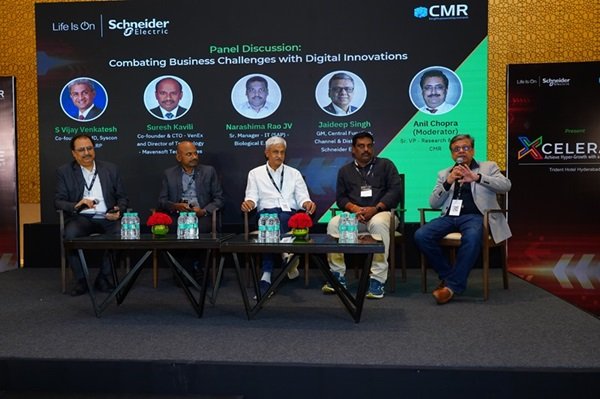The Xcelerate 2024 Hyderabad Chapter brought together a panel of industry leaders to explore how digital innovation is reshaping the business landscape. Veteran leaders like S. Vijay Venkatesh Co-founder & MD – Syscon Cronus – ERP; Suresh Kavili, Co-founder & CTO – VenEx and Director of Technology – Mavensoft Technologies; Narasimha Rao JV Sr. Manager – IT (SAP) – Biologicale E.Limited; Jaideep Singh – GM, Central Function, Channel & Distribution – Schneider Electric joined this panel shared their viewpoints. The moderator Anil Chopra, Sr. VP – Research & Editor – CyberMedia Research embarked discussion on how Hyderabad SMBs can embrace digital innovation for growth at scale. From ERP systems to the role of AI and emerging technologies, the event showcased diverse insights on digital transformation, providing a roadmap for businesses to stay competitive in an ever-evolving market. The insights from the industry veterans are as follows.
The Role of ERP in Digital Transformation
The discussion began with S Vijay Venkatesh, Co-founder & MD of Syscon Cronus – ERP, sharing his perspective on the foundational role that ERP (Enterprise Resource Planning) systems play in digital transformation. Despite being considered a traditional technology, ERP is still vital for consolidating company data and streamlining operations. Vijay emphasized that while ERPs may not provide real-time financial insights like daily P&L sheets, they are the cornerstone of future innovations like AI and machine learning. He highlighted that organizations must build a solid digital foundation to leverage advanced technologies effectively.
Narasimha Rao JV, Sr. Manager – IT (SAP) at Biological E. Limited, added from his experience in implementing SAP ERP systems. He explained how transitioning from legacy systems to modern ERP solutions significantly enhances efficiency, especially with the integration of RPA (Robotic Process Automation). “RPA allows greater automation, especially in vendor and customer processes, making everyday tasks quicker and more accurate,” Narasimha noted.
Real-Life Examples of Digital Efficiency
Suresh Kavili, Co-founder & CTO at VenEx and Director of Technology at Mavensoft Technologies, shared compelling examples of how digital transformation can impact small to mid-sized companies. “We helped a manufacturing unit optimize the activities of 200 sales representatives, resulting in a 30-35% improvement in business performance. By tracking their routes and optimizing fuel expenses, we showed how centralized data and process automation can enhance efficiency, reduce costs, and improve decision-making,” he explained. Suresh’s real-world insights underscored the tangible benefits that digital tools can bring to business operations.
Digital Innovation at Schneider Electric
Jaideep Singh, GM of Central Function, Channel & Distribution at Schneider Electric, provided an inspiring look at how digital innovation has transformed Schneider Electric’s operations. He spoke about their Hyderabad plant, one of Schneider’s most modernized facilities, which has embraced digitization to reduce waste, improve product quality, and enhance customer satisfaction. Jaideep emphasized the importance of real-time, connected devices in ensuring business continuity. “In today’s competitive environment, reducing downtime is crucial, and connected devices allow us to monitor performance in real time, ensuring that our systems run smoothly,” he shared.
Jaideep also spoke about how Schneider Electric’s R&D and customer-facing processes have benefited from digital solutions. “All our products now come with network connectivity cards and software that allow them to be monitored via mobile devices. This ensures that preventive maintenance can be carried out before a failure occurs, reducing downtime and increasing customer satisfaction,” he explained.
Choosing the Right Technology for Digital Transformation
Suresh also touched on the importance of selecting the right technology for digital transformation. He pointed out that low-code/no-code platforms are becoming increasingly popular, allowing businesses to quickly test new ideas with minimal investment. “This approach is particularly useful for companies looking to experiment and adapt quickly to market demands,” he added.
Vijay built on this by stressing the importance of functionality over technology. Using a vivid analogy, he compared functionality to actors like Rajinikanth or Prabhas and technology to the directors behind the scenes. “Customers only see the functionality—they don’t care what technology powers it. If the functionality fits, the technology is secondary,” he explained. This clear distinction between functionality and technology is essential, especially when implementing systems like ERP, where user acceptance and functionality are crucial for success.
Overcoming Resistance to Digital Transformation
However, as Vijay pointed out, one of the main challenges in implementing new technologies is overcoming internal resistance. “There’s often an ‘elephant in the room’ when it comes to digitization—the people within the organization who resist change. If leadership doesn’t address this resistance, even the most advanced systems can fail,” he said.
The panel agreed that addressing user acceptance is crucial for the success of any technology implementation. Without internal buy-in, even the most sophisticated digital systems can fall short of expectations.
The Future of Hiring and AI Integration
An audience member raised a thought-provoking question about hiring practices in the digital age. While AI and automation tools have reshaped many industries, recruitment often still relies on traditional methods. The panelists acknowledged that while platforms like LinkedIn and Indeed have automated some aspects of job postings, there is still significant room for innovation in this space. “There’s a massive opportunity here for new-gen AI to revolutionize recruitment,” remarked Jaideep.
Schneider Electric’s Digital Journey: A Case Study
One of the highlights of the event was a detailed case study of Schneider Electric’s 15-year journey toward digital transformation. With 31 factories across India and over 45,000 employees, Schneider’s Hyderabad plant stands out as a ‘smart factory’ equipped with cutting-edge IT systems. The facility’s focus on digitization has helped reduce waste, enhance product quality, and ensure business continuity—proving that a commitment to digital innovation can transform entire operations.
Jaideep explained how Schneider’s R&D center in India, responsible for designing products for global markets, relies on digital tools to address region-specific challenges. “The power conditioning needs of India are very different from those in Europe or the U.S., and our products are tailored to meet these unique demands. Without digitization, this level of customization wouldn’t be possible,” he shared.
Closing Thoughts: A Step-by-Step Journey
The panel wrapped up with a call to action for businesses to embrace digital innovation, but with a clear strategy in place. Suresh reminded the audience that digital transformation is a step-by-step journey, requiring careful evaluation, user education, and gradual adoption. “While advanced technologies are available, their success depends on addressing both technical functionality and user acceptance within the organization,” he concluded.
The event provided invaluable insights into the future of digital transformation, highlighting the importance of a strong foundation, the right technology, and a focus on user acceptance. As AI, cloud computing, and digital tools continue to evolve, businesses that embrace these changes stand to gain the most in terms of efficiency, customer satisfaction, and competitive advantage.
Watch the full session here: https://youtu.be/z6-OFS6htpM









